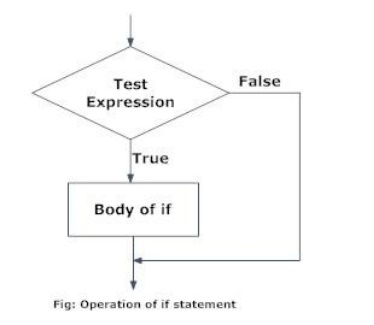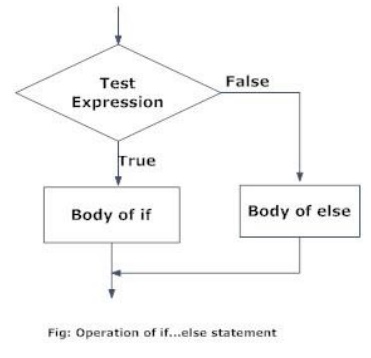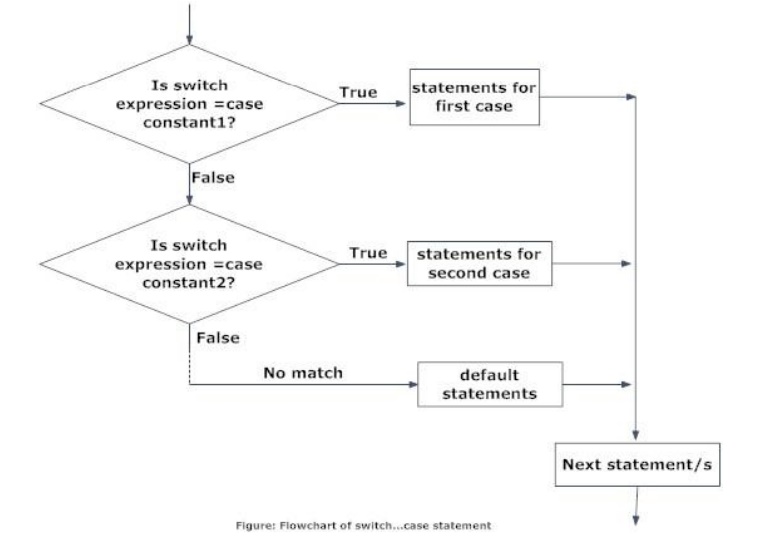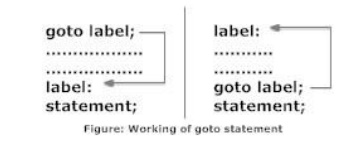Chapter: Programming and Data Structures
Conditional Statements
CONDITIONAL
STATEMENTS
Conditional statements are used to execute a
statement or a group of statement based on certain conditions. The ability to
control the flow of our program, letting it make decisions on what code to
execute, is valuable to the programmer. One of the important functions of the
conditional statement is that it allows the program to select an action based
upon the user's input.
C
Statements and Blocks
C has three types of
statement. Assignment
=
Conditional (branching) if (expression)
else switch
Control (looping) while (expression)
for
(expression;expression;expression) do
{block}
Blocks
These statements are grouped into blocks,
a block is identified by curly brackets...There are two types of block.
Statement blocks if ( i == j)
{
printf("martin
\n");
}
The statement block containing
the printf is only executed if the i == j expression
evaluates to TRUE.
Function blocks
int add( int a, int b) /* Function
definition */
{
int c;
c = a + b;
return c;
}
The statements in this block will only
be executed if the add function is called.
We
will look into following conditional statements.
1. if
2. if else
4. switch
5. goto
1 IF STATEMENT
If statement syntax
if
(test expression){
statement/s
to be executed if test expression is true;
}
If the test expression is true then,
statements for the body if, i.e, statements inside parenthesis are executed.
But, if the test expression is false, the execution of the statements for the
body of if statements are skipped.
Flowchart of if statement

Example of if statement
Write a C program to print the number
entered by user only if the number entered is negative.
#include <stdio.h> int main(){
int
num;
printf("Enter a number to check.\n"); scanf("%d",&num);
if(num<0) /* checking whether number is less than
0 or not. */ printf("Number=%d\n",num);
/*If test condition is true, statement above will be
executed, otherwise it will not be executed */ printf("The if statement in
C programming is easy.");
return
0;
}
Output
1
Enter
a number to check.-2
Number=-2
The
if statement in C programming is easy.
When user enters -2 then, the test expression
(num<0) becomes true. Hence, Number=-2 is displayed in the screen.
Output
2
Enter
a number to check.5
The
if statement in C programming is easy.
When the user enters 5 then, the test expression
(num<0) becomes false. So, the statement for body of if is skipped and only
the statement below it is executed.
2 IF ..ELSE
If...else statement
The if...else statement is used, if the
programmer wants to execute some code, if the test expression is true and
execute some other code if the test expression is false.
Syntax of if...else
if
(test expression)
statements to be executed if test
expression is true; else
statements
to be executed if test expression is false;
Flowchart of if...else statement

Example of if...else statement
Write
a C program to check whether a number entered by user is even or odd
#include <stdio.h> int main(){
int
num;
printf("Enter a number you want to
check.\n"); scanf("%d",&num);
if((num%2)==0) //checking whether
remainder is 0 or not. printf("%d is even.",num);
else
printf("%d is odd.",num);
return 0;
}
Output
1
Enter a number you want to check. 25
25
is odd.
Output
2
Enter a number you want to check. 2
2 is even.
3 IF.. ELSEIF..ELSE
Nested if...else statement
(if...elseif....else Statement)
The if...else statement can be used in
nested form when a serious decision are involved.
Syntax of nested if...else statement.
if
(test expression)
statements to be executed if test
expression is true; else
if(test
expression 1)
statements to be executed if test
expressions 1 is true; else
if
(test expression 2)
.
.
.
else
statements
to be executed if all test expressions are false;
How
nested if...else works?
If the test expression is true, it will execute the
code before else part but, if it is false, the control of the program jumps to
the else part and check test expression 1 and the process continues. If all the
test expression are false then, the last statement is executed.
The
ANSI standard specifies that 15 levels of nesting may be continued.
Example
of nested if else statement
Write
a C program to relate two integers entered by user using = or > or <
sign.
#include <stdio.h> int main(){
int
numb1, numb2;
printf("Enter two integers to check".\n);
scanf("%d %d",&numb1,&numb2);
if(numb1==numb2) //checking whether two
integers are equal. printf("Result: %d=%d",numb1,numb2);
else
if(numb1>numb2) //checking whether
numb1 is greater than numb2. printf("Result: %d>%d",numb1,numb2);
else
printf("Result:
%d>%d",numb2,numb1); return 0;
}
Output
1
Enter two integers to check. 5 3
Result:
5>3
Output
2
Enter two integers to check. -4 -4
Result:
-4=-4
4
SWITCH....CASE STATEMENT
Decision
making are needed when, the program encounters the situation to choose a
particular statement among many statements. If a programmar has to choose one
among many alternatives if...else can be used but, this makes programming logic
complex. This type of problem can be handled in C programming using
switch...case statement.
Syntax of switch...case
switch
(expression)
{
case
constant1:
codes to be executed if expression equals to
constant1; break;
case
constant2:
codes to be executed if expression equals to
constant3; break;
.
.
.
default:
codes
to be executed if expression doesn't match to any cases;
}
In
switch...case, expression is either an integer or a character. If the value of
switch expression matches any of the constant in case, the relevant codes are
executed and control moves out of the switch...case statement. If the
expression doesn't matches any of the constant in case, then The default statement is executed.

Example
of switch...case statement
Write a program that asks user an
arithmetic operator('+','-','*' or '/') and two operands and perform the
corresponding calculation on the operands.
/*
C program to demonstrate the working of switch...case statement */
/*
Program to create a simple calculator for addition, subtraction, multiplication
and division */
# include <stdio.h> int main(){
char operator; float num1,num2;
printf("Enter operator +, - , * or
/ :\n"); operator=getche();
printf("\nEnter two operands:\n");
scanf("%f%f",&num1,&num2); switch(operator)
{
case '+':
printf("num1+num2=%.2f",num1+num2); break;
case
'-':
printf("num1-num2=%.2f",num1-num2); break;
case '*':
printf("num1*num2=%.2f",num1*num2); break;
case '/':
printf("num2/num1=%.2f",num1/num2); break;
default:
/* if operator is other than +, -, * or
/, error message is shown */ printf(Error! operator is not correct");
break;
}
return
0;
}
Output
Enter
operator +, -, * or / :
/
Enter two operators: 34 3
num2/num1=11.33
Notice break statement at the end of each case,
which cause switch...case statement to exit. If break statement are not used,
all statements below that case statement are also executed.
5
GOTO
In C programming, goto statement is used for
altering the normal sequence of program execution by transferring control to
some other part of the program.
Syntax
of goto statement
goto
label;
.............
.............
.............
label:
statement;
In
this syntax, label is an identifier.
When, the control of program reaches to goto statement, the control of the
program will jump to the label: and executes the code/s after it.

Example
of goto statement
/*
C program to demonstrate the working of goto statement.*/
# include <stdio.h> int main(){
float num,average,sum; int i,n;
printf("Maximum no. of inputs: ");
scanf("%d",&n); for(i=1;i<=n;++i){
printf("Enter n%d: ",i);
scanf("%f",&num); if(num<0.0)
goto jump; /* control of the program jumps to label
jump */ sum=sum+num;
}
jump: average=sum/(i-1);
printf("Average: %.2f",average); return 0;
}
Output
Maximum
no. of inputs: 4
Enter
n1: 1.5
Enter
n2: 12.5
Enter
n3: 7.2
Enter
n4: -1
Average:
7.07
Though goto statement is included in ANSI standard
of C, use of goto statement should be reduced as much as possible in a program.
Reasons
to avoid goto statement
Though, using goto statement give power to jump to
any part of program, using goto statement makes the logic of the program
complex and tangled. In modern programming, goto statement is considered a
harmful construct and a bad programming practice.
The goto statement can be replaced in most of C
program with the use of break and continue statements. In fact, any program in
C programming can be perfectly written without the use of goto statement. All
programmer should try to avoid goto statement as possible as they can.
Related Topics